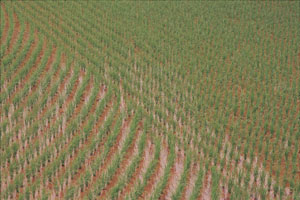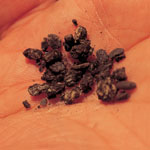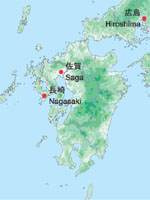Reflections on Rice
Back to Contents of Issue: June 2004
|
|
|
|
by Michael E. Stanley |
|
 By early June, Japan's rice paddies are full of vigor. They will flourish in the humid monsoon weather of the tsuyu rainy season to follow. It's easy to forget that rice is native to tropical latitudes. Basing the sustenance of northeast Asia on rice is akin to basing the economy of the British Isles on bananas, breadfruit, or oranges.
In October of last year, researchers in South Korea revealed that they had found the oldest cultivated rice. They carbon-dated a small clutch of grains from an archaeological excavation at Sorori, in Chungbuk province, and were stunned to find that the rice was between 14,000 and 15,000 years old. The previous record had been from a sample recovered in China, the date of which was some 2,000 years younger.
Both of these dates reveal the early genesis of agriculture in northeast Asia. At that time, the world was in the grip of last Pleistocene glaciers. Europe was populated by tribes of Paleolithic hunters. The Americas were about to receive their first human inhabitants, nomadic hunter-gatherers from Asia.
But rice was already on the menus of the chilly Korean peninsula, thousands of years before wheat and other staple crops were to make their appearance.
During a visit to the 2,000-year-old site at Yoshinogari, in Kyushu's Saga Prefecture, a Japanese archaeologist showed me some carbonized rice grains from that era. These were most likely the remains from an ancient government granary fire. Looking at them, my thoughts wandered to those who planted and harvested them -- and to the world they knew. The humble rice grain may tell us more about ourselves than we could ever have imagined. @
|
|
Note: The function "email this page" is currently not supported for this page.


 From all available evidence, rice arrived in Japan about two millennia ago, and was a key aspect in the rise of what was to become the Yamato state. Compared to vegetable crops, say, or such perishables as meat or fish, rice was relatively easy to store and transport. It provided a medium for economic management; the concerted effort needed for its successful production required mechanisms of political control. The discovery in South Korea makes one wonder how far back such concepts might have existed.
From all available evidence, rice arrived in Japan about two millennia ago, and was a key aspect in the rise of what was to become the Yamato state. Compared to vegetable crops, say, or such perishables as meat or fish, rice was relatively easy to store and transport. It provided a medium for economic management; the concerted effort needed for its successful production required mechanisms of political control. The discovery in South Korea makes one wonder how far back such concepts might have existed.




